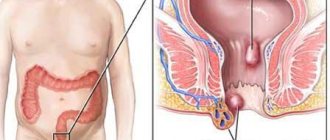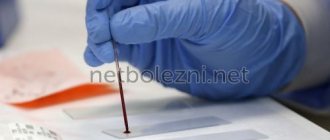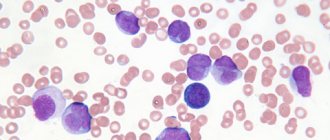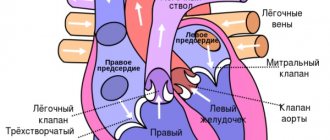What is menopause in women: symptoms, age, treatment of possible problems
Menopause (menopause) is a period of gradual decline in the body's reproductive function, which is caused by a decrease in the production of sex hormones. At this stage, menstrual flow (months) becomes irregular, scanty and eventually stops. This occurs due to a decrease in the production of estrogen and progesterone, depletion of the follicular reserve of the ovaries during menopause, and their atrophy, which leads to a decrease in their weight and size by almost half.
Signs of menopause (Climax), as well as the time of their first appearance, vary and are individual for each woman.
Some may complain of hot flashes, headaches, unstable blood pressure, while others may practically not notice changes in their own body, except for the cessation of menstruation, that is, this period passes without symptoms. If the symptoms of the onset of menopause cause a deterioration in a woman’s quality of life, then appropriate therapy is prescribed, which will be discussed below.
When do the first signs of menopause appear: the age of women
The time of onset of this period is individual for each woman and depends on a number of factors (heredity, general health, number of births in history). On average, the age at which the first symptoms of menopause appear is 50 years, but in some cases, the onset of menopause can be observed at both 40 and 60 years. The greatest intensity of menopause symptoms usually persists for a year, after which it gradually decreases and ends.
Separately, it is worth noting early menopause. Symptoms of this condition can begin as early as 28-30 years of age. If the first signs of menopause occur so early, there is a risk of developing cardiovascular diseases and osteoporosis at a young age.
Expert opinion
The onset of early menopause quite often coincides with a woman’s period of social and sexual activity. Therefore, reducing the intensity of menopause symptoms is important not only from a medical but also from a social point of view.
Obstetrician-gynecologist of the highest category Oksana Anatolyevna Gartleb
Healthy lifestyle
To reduce the manifestations of tachycardia during menopause it is necessary:
- lead a healthy lifestyle;
- to refuse from bad habits;
- ensure proper sleep.
Night rest should last at least 6–8 hours. If you are worried about insomnia, sedatives, teas with chamomile, lemon balm or valerian can help.
It is useful to play sports, but physical activity should be moderate. It is recommended to go for a morning jog, walk in the fresh air, and visit the pool. Yoga, reflexology, and massage have a beneficial effect on the nervous system.
It is recommended to review your diet and switch to proper nutrition. Fatty, fried foods increase cholesterol levels in the blood, which further complicates blood circulation, as lipid plaques are deposited on the walls of blood vessels and can lead to the formation of blood clots, heart attack, stroke, and coronary artery disease.
During menopause, you need to eat more fresh vegetables and fruits, whole grain cereals, seafood, and dairy products. You should limit the consumption of sweets, because they disrupt carbohydrate metabolism, promote excess weight gain, this negatively affects the functioning of the cardiovascular and endocrine systems, and contributes to the development of tachycardia and diabetes.
The first symptoms of menopause in women aged 40-50: how does menopause begin?
Among the main signs of menopause after 40, which appear first, are the following:
- Hot flashes, sweating. Hot flashes are the first signs of menopause, which 75-85% of women experience. Hormonal changes in the body during menopause affect thermoregulation processes. As a result of changes in hormonal levels during menopause, a woman may suddenly experience bouts of fever, which usually last several minutes and go away on their own. The mechanism of their occurrence is associated with the effect of estrogens on the hypothalamus, which contains the thermoregulation center that controls the processes of retaining heat by the body. When the amount of estrogen decreases during menopause, signals are sent to the hypothalamus that the body is overheating, which results in increased sweating and dilation of peripheral blood vessels. At such moments, the woman’s face and neck turn red, beads of sweat appear on the skin, the heartbeat quickens, dizziness, nausea and weakness may be present. At the end of the attack, profuse cold sweat may appear, accompanied by trembling.
- Heart rhythm disturbances during menopause. Tachycardia during menopause is caused by a decrease in estrogen levels, which normally affects the maintenance of normal functioning of the cardiovascular system.
- Dizziness, headache. These symptoms of incipient menopause can be caused by high/low blood pressure, as well as its sudden changes.
- Forgetfulness. Changes in hormonal levels lead to a decrease in vascular tone and affect cerebral circulation, which is why women during menopause complain of memory problems.
- Unstable emotional background during menopause. A decrease in the level of estrogen and endorphins leads to tearfulness, irritability and excessive sentimentality.
- Lack of thyroid hormones (hypothyroidism). Symptoms of hypothyroidism in menopausal women include apathy, difficulty concentrating, and hair loss.
- Vaginal dryness, itching and burning in the vagina during menopause. Due to a decrease in estrogen levels, there is a decrease in the production of natural vaginal lubrication, the intensity of blood flow in the vessels of the vaginal walls decreases, and thinning of the mucosa occurs. All this leads to dryness and itching; intimacy during menopause causes painful sensations.
- Osteoporosis. Osteoporosis is one of the dangerous symptoms of menopause that can lead to bone fractures. The reason for the decrease in bone density is the gradual leaching of calcium from the body, as well as a disruption in the absorption of phosphorus and vitamin D, a lack of silicon, boron, fluorine, magnesium and manganese.
- Gaining excess weight. Weight changes are explained by a decrease in the rate of metabolic processes, an attempt to compensate adipose tissue for extragonadal synthesis of sex hormones, which is one of the characteristic symptoms of female menopause.
- Decreased skin tone. One of the functions of estrogens is to maintain the elasticity of the skin. As the production of these hormones decreases, skin tone deteriorates, resulting in wrinkles, dryness, and flaking during menopause.
- The occurrence of mastopathy and chest pain due to ongoing hormonal changes.
What to do during an attack
If you are worried about heartbeat during menopause, treatment begins with sedatives. At home you can drink tincture of Valerian, Motherwort, and Nervo-Vit tablet. These drugs are made from herbs that have a sedative effect. Panic, fear, irritability go away, sleep improves, the heartbeat gradually normalizes, and the functioning of the nervous system is restored.
If an attack of tachycardia does not stop after taking a sedative, it is necessary to apply a cold compress to the forehead. This helps relieve the symptoms of hot flashes and relieves the feeling of heat. Pressing on the eyeballs helps normalize heart rate. The eyelids are applied several times for 10 seconds. Another effective remedy is a strong cough, which must be induced artificially.
If all of the above measures do not help normalize your health, the attack of tachycardia does not go away, your blood pressure does not return to normal, you need to call a doctor.
Indications for emergency medical care are:
- pain in the chest area;
- loss of consciousness;
- shortness of breath, dizziness;
- causeless attacks of tachycardia;
- severe decrease in blood pressure.
To stop the attack, the patient is given intravenous lidocaine, drugs that stabilize blood pressure. The woman is hospitalized and undergoes further treatment in a hospital setting.
Problematic features of menopause in women: symptoms and treatment
In some cases, the manifestations of menopause cause a woman such a severe deterioration in her quality of life that she has to seek medical help to reduce them. Below you will find general information regarding the treatment of menopausal symptoms, but remember that treatment should be prescribed by a specialist.
Self-medication can lead to new health problems and worsening symptoms of menopause.
Treatment of hot flashes during menopause
For frequent and intense hot flashes that cause physical and emotional discomfort to a woman, menopausal hormone therapy (MHT) medications may be prescribed. They contain analogues of sex hormones - both plant and synthetic origin. More often it is a combined drug based on estrogen and progesterone, which has a protective effect on the uterus (endometrium) and mammary glands.
To achieve the best results, it is advisable to start taking hormone replacement drugs at the very beginning of menopause, when its first symptoms appear. The dosage and regimen should be drawn up by a doctor, taking into account the woman’s general health, medical history, age, TSH, FSH levels.
Despite the fact that menopausal hormone therapy can reduce the unpleasant symptoms of menopause, in some cases its prescription is impossible. We are talking about absolute contraindications to taking MHT - such as heart attack (Infarctus) and/or stroke (Insultus), deep vein thrombosis, renal or liver failure, hormone-dependent oncological diseases, autoimmune diseases.
Preparations based on phytoestrogens, for example, Climafemin Ginocomfort, act as an effective alternative to MHT. This is a dietary supplement that contains the phytoestrogen genistein, an organic substance that helps reduce hot flashes and sweating, normalizes metabolism and hormonal levels, and improves sleep quality. In addition to genistein, the product contains active ingredients such as vitamin E, coenzyme Q10 and grape seed extract. All of them have a beneficial effect on a woman’s body, helping to preserve youth and normal well-being.
Treatment of hypertension during menopause
If the symptoms of menopause are accompanied by increased blood pressure, treatment may also include taking antihypertensive drugs (diuretics and diuretics).
Normalization of psycho-emotional state
If during menopause a woman experiences serious emotional instability, even to the point of developing depressive states, she may be recommended sedatives, and in especially severe cases, antidepressants.
Therapy for osteoporosis during menopause
To combat such a symptom of menopause in women as osteoporosis, they are prescribed to take bisphosphonates, calcitonin, strontium preparations, fluoride salts, vitamin-mineral complexes and food supplements containing boron, calcium, vitamins K1 and D. During menopause, it is recommended to include foods in the diet foods rich in calcium and vitamin D (milk, hard cheese, poppy and sesame seeds, soy, nuts, fresh herbs, fish; beef and pork liver, egg yolks, fish oil, cod and halibut liver, butter).
To reduce the manifestations of osteoporosis during menopause, it is necessary to stop smoking, since tobacco helps remove calcium from the body.
Combating vaginal dryness during menopause
To solve the problem of vaginal dryness caused by the onset of menopause, you can use special intimate gels. For example, you can use the Gynocomfort moisturizing gel, which provides relief from natural vaginal secretions and eliminates itching, dryness, burning and irritation in the vagina.
This product was tested during clinical studies conducted at the Department of Dermatovenereology with the clinic of St. Petersburg State Medical University, under the leadership of Ignatovsky A.V. and Sokolovsky E.V. Clinical studies have shown that due to the components included in the gel, the use of the product helps to achieve good hydration.
Neurologist Dmitry Shubin and the appearance of menopause. Live healthy!
The mucus-like consistency of mallow extract, which is part of the product, envelops and moisturizes the mucous membrane of the vulva, has a mild soothing and anti-inflammatory effect on it. Chamomile extract has a beneficial effect on existing microcracks, promoting their speedy regeneration. Panthenol and bisabolol eliminate irritation and have antibacterial properties. Moisturizing gel "Ginocomfort" was developed by specialists from a pharmaceutical company and has the necessary certificates of conformity.
Also, during menopause, a gynecologist may recommend the use of vaginal suppositories containing herbal or synthetic analogues of sex hormones. Some folk remedies for treating crisis symptoms can also be extremely effective. But it is better to coordinate everything with your doctor.
The use of such products helps to normalize the thickness of the mucous membrane during its atrophy, enhance the formation of vaginal secretions, and maintain an optimal level of acidity.
Herbal treatment for heart rhythm disturbances during menopause
Heart pain during menopause can also be eliminated with natural treatment using a variety of herbs. But we must remember that in most cases, herbal medicine calms the psyche, so the attacks of arrhythmia go away. But if you have serious heart disease, then you should definitely consult a doctor, because herbs will be powerless. The main thing to remember is that herbal medicine acts as support for the body.
The following plants will help improve your psychological state:
- valerian;
- rosemary;
- sage;
- blackberry fruits and shoots;
- motherwort;
- St. John's wort;
- wormwood;
- hawthorn.
How to reduce symptoms and signs of menopause in women: useful tips
With the onset of menopause, it is recommended to adhere to the following recommendations:
- Move more, engage in feasible sports and physical exercise.
- Master breathing and relaxation techniques
- Eat right and stay hydrated.
- Exercise your brain (read, solve crosswords, learn foreign languages).
- Perform exercises that train fine motor skills.
Remember: a correct lifestyle and timely consultation with a doctor if necessary will allow you to reduce unpleasant symptoms during menopause!
Sources:
- SOFT CLIMAX. Zhexembinova R. S. // Bulletin of surgery of Kazakhstan. – 2011. – No. 4. – P.98.
- MODEL OF SPECIALIZED CARE FOR WOMEN WITH Climacteric Disorders. Kholodova L.N., Protopopova N.V., Kravchuk L.A., Sharifulin M.A. // Siberian Medical Journal (Irkutsk). – 2004. – P. 76-77.
- Guide to outpatient care in obstetrics and gynecology / ed. V. E. Radzinsky. — 2nd ed., revised. and additional - M.: GEOTAR-Media, 2014. - 944 p.
- Gynecology: textbook. for universities / ed. G.M. Savelyeva, V.G. Breusenko. — 4th ed., revised. and additional - M.: GEOTAR-Media, 2012. - 432 p. : ill.
- https://www.medicinenet.com/menopause/article.htm
- Menopausal syndrome. EAT. Vikhlyaeva // Guide to endocrine gynecology. - M.: MIA. - 1998. - P. 603-650.
- Therapy of depressive disorders in general medical practice. Dubnitskaya, E.B. A.V. Andryushchenko // Modern psychiatry. – 1998. – No. 2. – pp. 10-14.
- Menopause and perimenopausal period. R.B. Jaffe // Reproductive endocrinology. Edited by S.S.K. Yen, R.B. Jaffe. – M.: Medicine. - 1998. - T.2. – pp. 560-586.
- https://www.menopause.org/for-women/menopauseflashes/menopause-symptoms-and-treatments/are-we-there-…
- https://www.healthline.com/health/menopause/symptoms-signs
- https://nccih.nih.gov/health/menopause/menopausesymptoms
Popular questions
Hello, hot flashes have begun, mood changes have begun, (menopause) the uterus has been removed due to mime.
What can you take in combination with vitamins to reduce this condition? You can start taking Ginocomfort climafemin 1t once a day for 3 months to relieve vegetative storms.
Hello, burning sensation in the vagina, menopause, the doctor prescribed Levomekol ointment, what else can I use?
Hello! In your case, you can use Ginocomfort gel with mallow extract, 1 dose 1 time per day for 10 days, and then 2 times a week for a long time. This product contains herbal components, bisabolol and panthenol, which will moisturize and restore the mucous membranes of the genital tract. In the absence of contraindications, it is possible to use estriol-containing drugs, for example Ornion cream, which will be etiotropic therapy.
Hello! Surgical menopause, breast cancer in 2011. I suffer from vaginal dryness, periodic cystitis and constant vaginitis after each sexual intercourse. What prevention methods are possible? After every contact?
During menopause, you can use products that do not contain hormonal components. In the Gynocomfort line, this requirement is met by a gel with mallow extract. This will help not only moisturize the mucous membranes, but also restore elasticity and aid in regeneration. The gel can be used both before contact and as needed without a time limit.
Hello, I’m 47 years old, menopause has been going on for 5 years now, at 42 it ended and that’s it, at first I didn’t take anything, the condition worsened, hot flashes and mood swings, poor sleep. 3 years ago, on the doctor’s recommendation, I took Femoston 1/5 for a year. I took it for 1 year, felt good, stopped taking it, after all, it’s hormones, now I feel bad again. hot flashes, increased blood pressure, palpitations, poor sleep, hot flashes mainly at night and depression, tell me Ginocomfort Klimafemin could help me or should I take Femoston again?
Hello!
At this stage, you can start by taking Gynocomfort climafemin. This will improve your well-being and you will have time to conduct additional examinations before resuming menopausal hormone therapy, if necessary: pelvic ultrasound, mammography, lipid spectrum, general blood test, TSH level, consultation with a therapist and obstetrician-gynecologist, smears for flora and oncocytology. For an accurate diagnosis, contact a specialist








